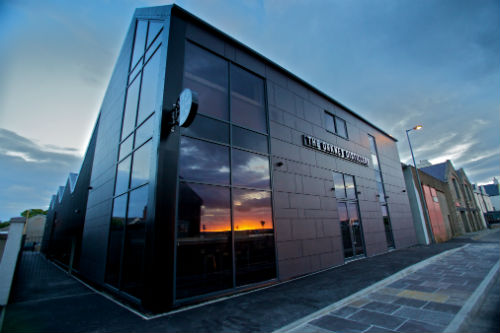University teams up with European Marine Energy Centre, Highland Park and The Orkney Distillery
Funding has been awarded to an Edinburgh Napier collaborative project aimed at enabling the use of green hydrogen as fuel in the distilling process.
HySpirits 2 has received £58,781 from the UK Government’s Department of Business, Energy, and Industrial Strategy (BEIS) to produce a feasibility study assessing a host of technologies.
Led by the European Marine Energy Centre (EMEC), HySpirits 2 brings together leading industry partners including global distilling group Edrington, owners of world-famous Highland Park distillery, and local craft distillery Orkney Distilling Ltd.

Both partners have extensive sectoral knowledge and will deliver end user data inputs as well as supporting the development of a market roll-out strategy.
The partnership is completed by Edinburgh Napier, with the University’s industrial decarbonisation team leading the pilot study design and hydrogen technology assessments. During the feasibility study, all project partners will contribute to scoping a pilot demonstration to take forward into the next phase of the project.
Funding was awarded through the BEIS Green Distilleries Competition, a £10 million fund aiming to help UK distilleries decarbonise through innovative fuel switching projects, including those focusing on low carbon fuels such as hydrogen. Phase 1 of the competition focuses on technology feasibility whilst Phase 2 of the programme will target real world technology demonstration for selected projects.
Kwasi Kwarteng, Secretary of State for Business, Energy and Industrial Strategy, said: “Building back greener from the pandemic is something we can all raise a toast to. Every business can play a part in the green industrial revolution and this funding will allow UK distilleries to lead the way by making their production cleaner while also creating jobs.”
Professor John Currie, Director of the Scottish Energy Centre at Edinburgh Napier University, said: “Industrial fuel switching, in order to lower carbon emissions, provides a significant challenge, particularly in the food and drink sector. This project brings together a partnership which will focus on assessing a range of viable technology options that give the greatest emissions reductions for distillers. Ensuring commercial viability through to a fully sustainable end product will lay the path towards the future of green distilling.”
The grant award follows on from the first HySpirits project completed last year, which investigated the feasibility of using a hydrogen-fuelled thermal fluid heating solution to decarbonise the distilling process in The Orkney Distillery. HySpirits 2 will build on this work, broadening the investigation by assessing four different technology pathways to facilitate green hydrogen fuel-switching in the distilling sector.
The technologies to be assessed within the project include; thermal fluid technology, steam technology, direct burn technology and dual fuel technology. Following assessment, the optimal technology pathway will be selected and used by the consortium to design a demonstration project to be considered for Phase 2 funding to prove the solution in a real-world context.
James Walker, Hydrogen Manager at EMEC, said: “Hydrogen offers a potentially very compelling alternative fuel for producing high grade heat in industry. With many distilleries located in remote areas off the natural gas network and using fuel oils to generate process heat for malting and distilling, there is great scope for applying the findings from our project to a cross section of the wider industry.”
Founded in 1984 by Professor Currie, the University’s Scottish Energy Centre (SEC) is a portal for research, knowledge transfer, and expert services activity in the energy sector. The portfolio of activities has expanded to help support public sector organisations, businesses, and industry with regard to research and knowledge transfer needs, and in meeting the challenges of energy price increases, government initiatives, statutory requirements and carbon reduction targets.